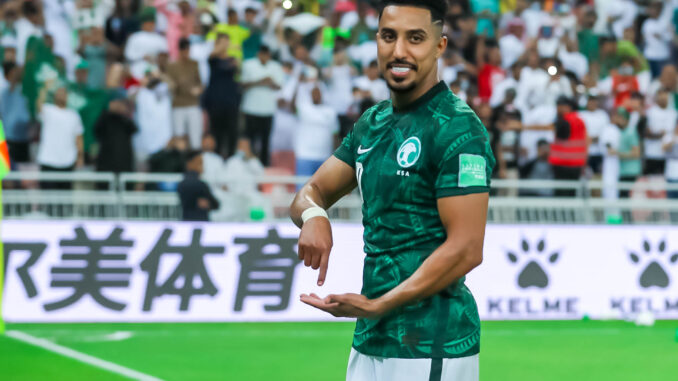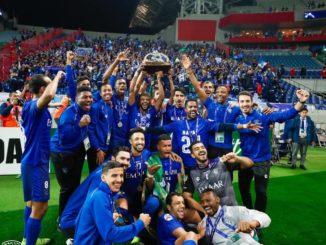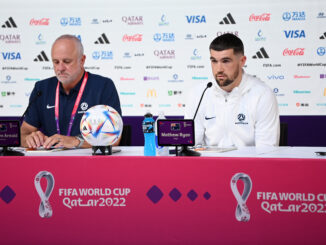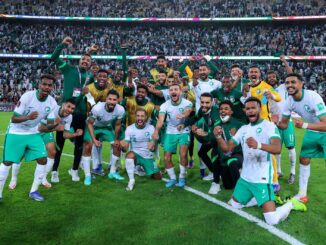

The Asian Game’s coverage of the FIFA World Cup Qatar 2022 is proudly sponsored by SMC.
Ask any avid fan of Asian football who the best player on the continent was over the last few years, at club or international level, and most will likely single out Saudi star Salem Al-Dawsari.
Ahead of the player’s second successive World Cup appearance, however, few outside of Asia will even recognise his name, let alone appreciate his undeniable quality and considerable CV that has grown from strength-to-strength since the last time he appeared on the global stage.
For this, Qatar represents the potential defining point of a distinguished, if not turbulent career.
On paper, a one club man aside from a brief stint in Europe, Al-Dawsari’s eleven-year spell at Saudi super club Al-Hilal has only heralded just over 200 appearances, an eyebrow-raising figure even for those within Asia when you consider he has amassed over 65 caps for his country in that time.
It alludes to the struggles he had, particularly early in his career with fitness, consistency, and temperament, to become the high-impact player we all see today.
While that brief cameo in Europe (one solitary substitute appearance in Spain), indicates being an afterthought, possibly a regret, growing from that crucial juncture in a player’s career, let alone a player from the Middle East, looks to have defined his legacy at home and abroad ever since.
Jeddah born, Riyadh bred
Tracing his steps back to his childhood, Al-Dawsari, later to become a modern-day legend in Saudi Arabia’s capital Riyadh, was born and raised on the other side of the country, in the equally influential Jeddah.
On his father’s advice, his pilgrimage as a teen to move away from home to Saudi’s first city, has come to define his status as a one true blue; in the colours of Al-Hilal.
He came through as a prodigal starlet; making a goal scoring start as a 20-year-old in the Riyadh derby against nemesis Al-Nassr. He defined what a precocious and untamed attacking talent looked like and began to win hearts immediately within the Al-Hilal fan base.
While he started with a bang, it was quickly seen which of his deficiencies would hold him back from establishing himself as a regular starter, however, let alone the national team lynchpin we see today.
A chequered injury past hasn’t helped him, but his attitude and influence when he made it on to the pitch didn’t settle things either. At a club, who at the time were a far cry from the all-conquering continental behemoth they are today, Al-Dawsari was often seen as an individual impact player, great on the ball in tight spaces, but lacking the maturity of his peers.
His talent was evidently flamboyant and devastating, but so too was his fiery mentality. Flare ups in key moments hindered his early progress, often sucked into trouble where more maturity was required.
This was emphasised in one of many infamous battles of Riyadh, against neighbours Al-Nassr in 2015, where Al-Dawsari’s anger over a suspect officiating decision boiled over in the Saudi winger attempting to headbutt the unsuspecting guest referee John Beaton.
Not a day the young Scottish referee will forget in a hurry, and not one Al-Hilal would either. Al-Dawsari was suspended for six games, fined a week’s wages and castigated as a loose cannon. An immense talent but a fragile element of a side with greater ambition.
One ambition being their single minded focus on winning the AFC Champions League. Following 2014’s perceived embarrassment against Western Sydney Wanderers, Al-Hilal returned to the final in 2017, against Urawa Reds, heading to second leg in Japan all square after a 1-1 draw in the opening leg in Riyadh.
With the game well poised, Al-Dawsari’s lack of judgement again boiled over, sent off for a second yellow offence, that could very easily have seen a straight red; the enigmatic winger showed his Mr Hyde once more. A late goal from Urawa’s Rafael Silva put pay to a competition that felt out of reach for Al-Hilal, with Al-Dawsari in the firing line.
The end of the year, however, brought with it an opportunity. Ahead of Saudi Arabia’s return to the World Cup in 2018, Al-Dawsari’s career was about to see a change in momentum.
Spanish influence
While Saudi Arabia flourished on the Road to Russia in Asian World Cup Qualification, Al-Dawsari saw his opportunities limited, first by injury but too often in falling down the pecking order of a newly reinvigorated, Bert van Marwijk-led squad.
The Dutchman’s approach established a direct, physical style that got the very best out of a squad that had struggled to hit their potential for most of the previous decade, and it was something that rarely required the creative qualities of Al-Dawsari.
The winger’s merits weren’t lost on everyone though. Following van Marwijk’s premature exit upon qualification, under Argentine-Spanish coach Juan Antonio Pizzi, a tactician that implored possession, guile and ingenuity, Al-Dawsari became one of the first names on the team sheet and remained an ever present on the run up to the World Cup.
He did so as one of a handful of the Saudi squad that were sent to La Liga in Spain, in what was widely seen as a last-ditch six-month period to raise the technicality of the talent available ahead of the World Cup.
While on the face of it the project spectacularly failed, with the group barely amassing a handful of minutes between them, the long-term impact on Al-Dawsari’s game in particular has been demonstrable ever since.
His story at Villareal, while only appearing once from the bench, against Cristiano Ronaldo’s Real Madrid no less, was created off-the-pitch; in the training methods, the understanding of the European game and a growing sense of the maturity needed to succeed at the very top.
It’s often said that some can only achieve such enlightenment when they cast themselves out of their comfort zone; for Al-Dawsari that seems to have been his turning point.
While the subsequent World Cup was one to forget for Saudi Arabia, they signed off in style, with Al-Dawsari scoring a stoppage time winner against Egypt as they bowed out with an element of respect, but importantly the experience required to head home and aim to repeat the feat.
Pizzi and the Spanish adventure were mere brief moments of Al-Dawsari’s career, no longer than a year’s period, but something that’s had a clear impact on his individual game ever since.
While the rather methodical, tiki-taka style that embodied Pizzi’s approach at the time doesn’t necessarily fit Al-Dawsari’s individual game, it was able to hone his flamboyance into an effective output, with Pizzi not only making Al-Dawsari a key starter of the Saudi national team picture, but as he left, the focal point of the side’s attacking play.
On the path to being Asia’s finest
That understanding and confidence he demonstrated on the international stage grew into his club game, cementing his starting role as an ever-influential presence alongside the likes of Bafetimbi Gomis, Sebastian Giovinco and Andre Carillo; it was no coincidence that Al-Dawsari’s growing peak shone through during Al-Hilal’s renaissance on the continental stage.
Two years on from the very moment that encapsulated the old Al-Dawsari, Al-Hilal and their star winger turned the tables on the same Saitama stage, winning the AFC Champions League, this time around thanks to an Al-Dawsari opener, to cap off an individually impressive two-legged final.
In the last four years, since his much-fabled move to Villareal, Al-Dawsari has won three league championships, two Champions League titles, played at two Club World Cups, become the club’s fourth highest continental goal scorer and been crowned the ACL Player of the Year.
Not a bad upturn in form, considering he only featured for 33 minutes whilst in Spain.
Salem Al-Dawsari’s presence moving forward, both domestically and internationally, now under a more rounded coach in Herve Renard, transcends the confinements of expectation from five years ago.
From a useful winger, with a trick or too in his locker, capable of threatening in one-on-one opportunities, but often left as an isolated figure, to the driving force of a team, capable of creating or scoring off very little, makes him such a tantalising prospect ahead of the World Cup in Qatar.
Now 31, his legacy is almost set. He’s won it all in Asia at domestic and continental level, but there’s always something awaiting him to cement his legendary status internationally.
There have been suggestions in the past two years that a return to Europe beckoned, yet his brief six-month stint back in 2018 may have to suffice in attempting to emulate the likes of Sami Al-Jaber’s pursuit to push Saudi football further when he moved to England in 2000.
While Al-Dawsari may have ultimately failed in living up to Al-Jaber’s international appeal, he is a player that has carved out his own legacy and has more to write in his own way in the coming years.
As a neighbouring World Cup looms on the horizon, the prospect of Salem Al-Dawsari rewriting his and Saudi football’s story, is one we can look forward playing out.
PHOTO: twitter/SaudiNT
Listen to The Asian Game Podcast as Scott travels to Okayama to catch up with Stefan Mauk




